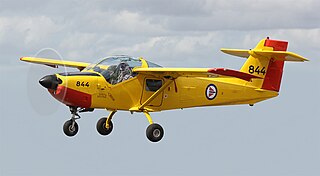
The Cessna 340 is a twin piston engine pressurized business aircraft that was manufactured by Cessna.

The Alpha Aviation Alpha 2000 is a two-seat, all-metal training and general aviation aircraft, designed by Chris Heintz and built in Hamilton, New Zealand. It continues the successful French Apex Aircraft's Robin R2000 series acquired upon Apex's purchase of the Avions Robin company.

The Fuji FA-200 Aero Subaru is a single-engine piston-powered monoplane built by Fuji Heavy Industries of Japan.

Saab MFI-15 Safari, also known as the Saab MFI-17 Supporter, is a propeller-powered basic trainer aircraft used by several air forces.

The Auster J/5 Autocar was a late 1940s British single-engined four-seat high-wing touring monoplane built by Auster Aircraft Limited at Rearsby, Leicestershire.

The Partenavia P.64B/P.66B Oscar is an Italian two/four-seat, single-engined, high-wing monoplane built by Partenavia.

The Piper PA-36 Pawnee Brave is a 1970s American single-engined, low-wing, propeller-driven agricultural plane built by Piper Aircraft.

The Piper Aerostar is an American twin-engined propeller-driven executive or light transport aircraft, designed by Ted R. Smith. It was originally built by Ted Smith Aircraft Company, which after 1978 became part of the Piper Aircraft Corporation.

The Maule M-4 is an American four-seat cabin monoplane designed by Belford Maule and built by the Maule Aircraft Company.

The Maule M-5 is an American four-seat cabin monoplane designed and built by the Maule Aircraft Company.

The Wassmer WA-51 Pacific is a French four-seat cabin monoplane designed and built by Société Wassmer. Different-powered variants include the Wassmer WA-52 Europa and the Wassmer WA-54 Atlantic. It was the world's first composite material-built aircraft.

The Jurca MJ-5 Sirocco is a two-seat sport aircraft designed in France in the early 1960s and marketed for homebuilding. It is one of many wooden homebuilt designs from Romanian born designer Marcel Jurca. Jurca, a Henschel Hs 129 pilot in World War II marketed the plans in Canada and America through Falconar Aviation. It is a low-wing cantilever monoplane of conventional configuration and wooden construction throughout. The tandem seats are enclosed by a bubble canopy, and the tailwheel undercarriage can be built as either fixed or with retractable main units. Marcel Jurca died on 19 October 2001, at which time plans were still available from the designer's website.

The Nord 1221 Norélan was a 1940s three-seat training monoplane designed and built in France by Nord Aviation.

The Malmö MFI-10 Vipan was a four-seat light utility monoplane designed and built in Sweden by Malmö Flygindustri. Only three aircraft were built and the type did not enter quantity production.

The Wassmer WA-80 Piranha is a French two-seat low-wing cabin monoplane trainer designed and built by Société Wassmer. Based on the same construction as the company's WA-50 four-seater, the WA-80 was a scaled down version. The prototype, registered F-WVKR, first flew in November 1975 powered by a 100 hp Rolls-Royce Continental O-200 engine. Wassmer appointed a receiver and suspended production in 1977 after 25 had been built.

The Piel CP.60 Diamant is a single-engine light aircraft designed in France in the 1960s and marketed for home building.

The Spencer Amphibian Air Car is an American light amphibious aircraft. The name was first used in 1940 for a prototype air vehicle that developed into the Republic Seabee. The name was later used by its designer Percival Spencer for a series of homebuilt amphibious aircraft roughly based on the Seabee design.

The Robin R 3000 is a French single-engined light aircraft designed and built by Avions Robin, which entered production in the 1980s.

The Robin DR.200 is a family of French conventional landing gear single-engined light touring or training cabin monoplanes. Originally produced by Centre Est Aéronautique the company later changed its name to Avions Pierre Robin.

The Trident TR-1 Trigull is a Canadian amphibious aircraft that was developed by Trident Aircraft of Burnaby, British Columbia and later Sidney, British Columbia. The aircraft was intended to be supplied as a complete ready-to-fly certified aircraft. The company encountered financial difficulties and only three prototypes were ever built.





















